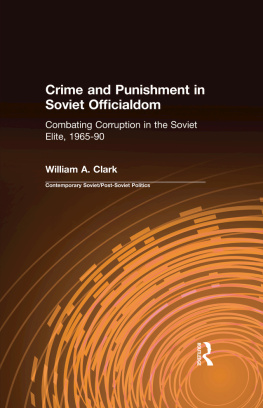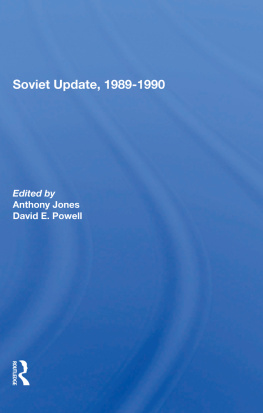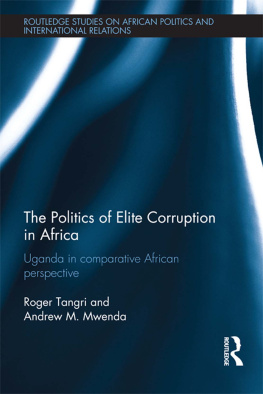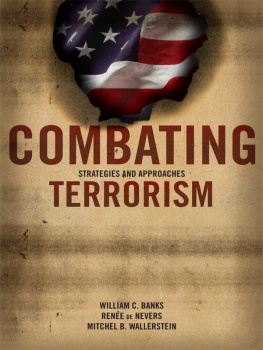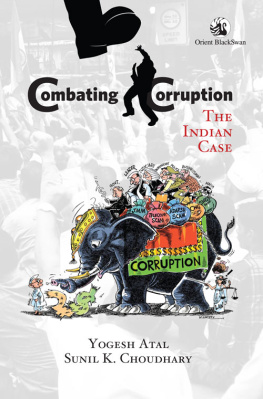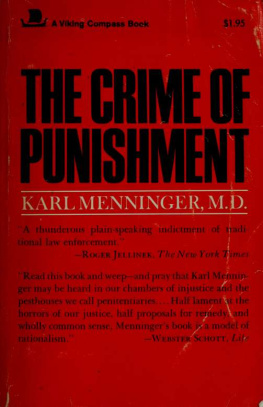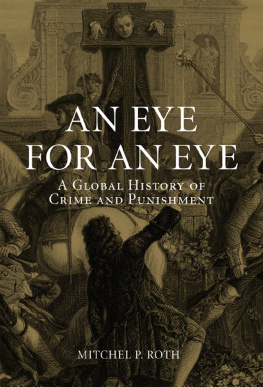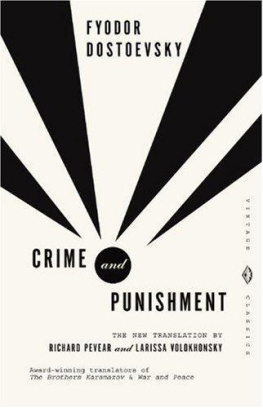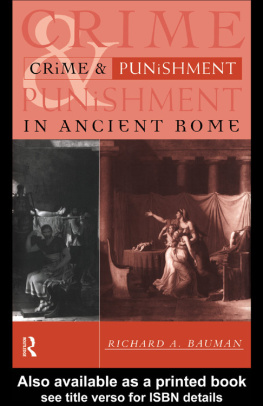William A. Clark - Crime and Punishment in Soviet Officialdom: Combating Corruption in the Political Elite, 1965-1990
Here you can read online William A. Clark - Crime and Punishment in Soviet Officialdom: Combating Corruption in the Political Elite, 1965-1990 full text of the book (entire story) in english for free. Download pdf and epub, get meaning, cover and reviews about this ebook. year: 1993, publisher: Routledge, genre: Politics. Description of the work, (preface) as well as reviews are available. Best literature library LitArk.com created for fans of good reading and offers a wide selection of genres:
Romance novel
Science fiction
Adventure
Detective
Science
History
Home and family
Prose
Art
Politics
Computer
Non-fiction
Religion
Business
Children
Humor
Choose a favorite category and find really read worthwhile books. Enjoy immersion in the world of imagination, feel the emotions of the characters or learn something new for yourself, make an fascinating discovery.
- Book:Crime and Punishment in Soviet Officialdom: Combating Corruption in the Political Elite, 1965-1990
- Author:
- Publisher:Routledge
- Genre:
- Year:1993
- Rating:5 / 5
- Favourites:Add to favourites
- Your mark:
- 100
- 1
- 2
- 3
- 4
- 5
Crime and Punishment in Soviet Officialdom: Combating Corruption in the Political Elite, 1965-1990: summary, description and annotation
We offer to read an annotation, description, summary or preface (depends on what the author of the book "Crime and Punishment in Soviet Officialdom: Combating Corruption in the Political Elite, 1965-1990" wrote himself). If you haven't found the necessary information about the book — write in the comments, we will try to find it.
William A. Clark: author's other books
Who wrote Crime and Punishment in Soviet Officialdom: Combating Corruption in the Political Elite, 1965-1990? Find out the surname, the name of the author of the book and a list of all author's works by series.
Crime and Punishment in Soviet Officialdom: Combating Corruption in the Political Elite, 1965-1990 — read online for free the complete book (whole text) full work
Below is the text of the book, divided by pages. System saving the place of the last page read, allows you to conveniently read the book "Crime and Punishment in Soviet Officialdom: Combating Corruption in the Political Elite, 1965-1990" online for free, without having to search again every time where you left off. Put a bookmark, and you can go to the page where you finished reading at any time.
Font size:
Interval:
Bookmark:
THE NEW SOVIET LEGISLATURE AND GORBACHEV'S POLITICAL REFORMS
Robert T. Huber and Donald R . Kelley . editors
PARTY POWER IN THE BREZHNEV ERA
James R. Millar, editor
FROM DE-STALINIZATION TO DISINTEGRATION
Robert Sharlet
THE RISE AND DECLINE OF THE SOVIET STATE
Eugene Huskey, editor
COMBATING CORRUPTION IN THE POLITICAL ELITE, 1965-1990
William A . Clark
ESSAYS IN POLITICS AND HISTORY
Susan G . Solomon , editor

2 Park Square, Milton Park, Abingdon, Oxon OX14 4RN
711 Third Avenue, New York, NY 10017, USA
No responsibility is assumed by the publisher for any injury and/or damage to persons or property as a matter of products liability, negligence or otherwise, or from any use of operation of any methods, products, instructions or ideas contained in the material herein.
Crime and punishment in Soviet officialdom: combating corruption in
the political elite, 19651990/William A. Clark
p. cm.
Includes bibliographical references and index.
ISBN 1-56324-055-6 (cloth)
ISBN 1-56324-056-4 (pbk.)
1. Political corruptionSoviet UnionHistory.
2. BureaucracySoviet UnionHistory.
3. Misconduct in officeSoviet UnionHistory.
I. Title.
JN6529.C6C58 1993
354.47009'94dc20
92-45245
CIP
ISBN 13: 9781563240553 (hbk)
| Public Administration and the Structure of Corruption in Soviet Officialdom |
| The Politics of Corruption and Anti-Corruption in the Soviet System |
Font size:
Interval:
Bookmark:
Similar books «Crime and Punishment in Soviet Officialdom: Combating Corruption in the Political Elite, 1965-1990»
Look at similar books to Crime and Punishment in Soviet Officialdom: Combating Corruption in the Political Elite, 1965-1990. We have selected literature similar in name and meaning in the hope of providing readers with more options to find new, interesting, not yet read works.
Discussion, reviews of the book Crime and Punishment in Soviet Officialdom: Combating Corruption in the Political Elite, 1965-1990 and just readers' own opinions. Leave your comments, write what you think about the work, its meaning or the main characters. Specify what exactly you liked and what you didn't like, and why you think so.

